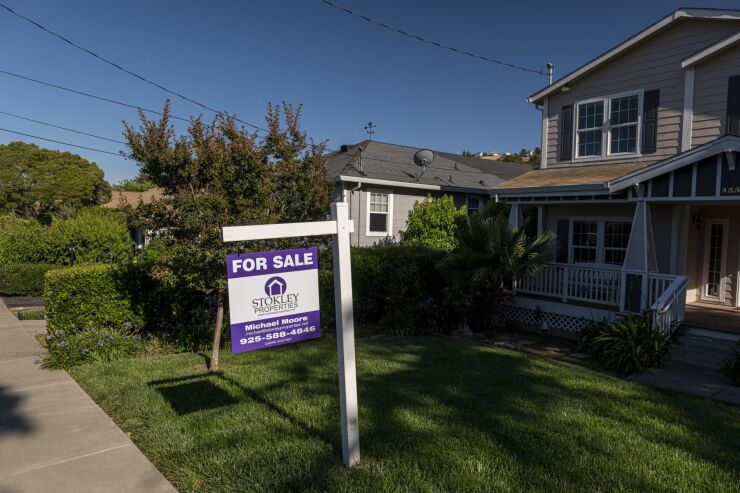Bank statement loans are coming under renewed scrutiny due to the Consumer Financial Protection Bureau's guidelines that require mortgage lenders to fully verify the income of self-employed borrowers.
Due diligence lawyers are scouring the mortgage landscape for problems in home loans on the theory that a recession in 2023 will force some borrowers into default and foreclosure. Lenders of bank statement loans are at particular risk of being sued by the borrower for failure to appropriately determine their ability to repay the loan. At issue is whether mortgage lenders are complying with the CFPB's Qualified Mortgage rule, including a preamble and commentary that
Alan Lindeke, the general counsel at Change Home Mortgage and an industry veteran who has worked as a senior compliance officer at Bank of California and Impac Mortgage, caused a brouhaha last month by claiming that most mortgage lenders that originate bank statement loans are not complying with the CFPB's QM rule. Lindeke alleged that lenders could face up to $10 billion a year in liability if consumers sue them for failing to document their income. However, Lindeke later conceded that the amount was "completely hypothetical" and that borrowers rarely sue their lender except in defense of a foreclosure.
The CFPB has said that lenders must document and verify all consumer deposits to determine that deposits are income and not a gift, a loan or other proceeds.
"The CFPB put the kibosh on bank statement loans," Lindeke said, reiterating comments in an
The CFPB revamped its QM rule in 2020 under former director Kathy Kraninger, replacing a previous 43% debt-to-income ratio with
Lenders previously could use a "reasonableness" standard under which they had to prove they had policies and procedures in place to verify a borrower's income. But the CFPB's QM rule that went into effect in October included a comment that a lender does not meet the requirements if they fail to confirm funds that qualify as a borrower's income.

A CFPB spokesman declined to comment on the QM rule.
Only a handful of mortgage lenders originate one-month or two-month bank statement loans that could be at issue. Lenders claim that short-term bank statement loans typically are made to self-employed borrowers with high credit scores and low loan-to-value ratios. Due diligence experts say the industry standard is to examine 12 months to 24 months of bank statements and use a worksheet to take out any extraordinary deposits. Lenders also hire third-party providers to verify a seller's guidelines and meet the requirements of the Dodd Frank Wall Street Reform and Consumer Protection Act of 2010.
Stephen Ornstein, co-leader of the consumer financial services team at the law firm Alston & Bird, said the CFPB's commentary in the QM rule casts some doubt on short-term bank statement programs. "I've always been concerned about limited bank statement programs," he said.
"To have a QM bank statement loan, a lender has to have a robust number of bank statements with an analysis of the inflow and outflow of what is going in and coming out," Ornstein added.
Lenders and compliance experts "always question large deposits, cash deposits or transfers that are not income," said Christene Riley, senior director of transaction management at Clayton, the due diligence firm owned by Covius Holdings. She added, "We do see lenders moving more toward 12 months" of bank statements, "but that's a very open door."
However, Riley said she doesn't think "there's a lot of heartburn" in the changes to the QM rule, though some lenders may be rethinking whether some bank statement loans can still qualify for QM status.
Bank statement loans made a resurgence before the pandemic and have generally performed well in recent years due to low default rates and home price appreciation. While unemployment rates and delinquencies remain low for now, bankers have had a recession on their minds for several months, in part because of the Federal Reserve's decision to tackle inflation by rapidly raising borrowing rates.
"Rates have risen so much that investors do not have comfort in understanding the prepayment risk and extension risk," said Vadim Verkhoglyad, vice president, head of quality assurance and co-head of research at dv01, a data and analytics firm owned by Fitch Group. He was referring to borrowers who refinance and prepay a loan to a lower rate or, alternatively, do not prepay and therefore extend the prepayment risk to investors.
Though most borrowers have plenty of equity in their home, the expectation is that as property values fall and more consumers get laid off, lenders that originate bank statement loans could see court challenges from borrowers alleging the lender did not verify a borrower's ability to repay a loan, as required by the QM rule. With interest rates rising, there is more sensitivity to the idea that a borrower could default and sue a lender.
"The CFPB does have a provision that specifically states a lender has to source the deposits, to make sure they know what is income," said Jeff DeMaso, senior regulatory compliance counsel at Clayton. "I see the concern, but I don't know that there's that much exposure from bank statement loans."
DeMaso was part of the Structured Finance Association's working group that examined the QM rule.
Lindeke agreed that borrowers rarely sue their lender except in defense of a foreclosure, and foreclosure rates remain incredibly low. He said the $10 billion in liability was "completely hypothetical," and was intended "to bring awareness to the industry," because most lenders have overlooked the nuance and commentary in the CFPB's rule.
"Everybody missed the changes," Lindeke said.
Others agree that short-term bank statement loans have likely dried up.
"The CFPB's commentary is a dagger in the heart of a one- or two-month bank statement loan," said Ornstein.





